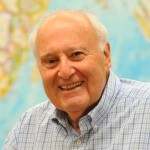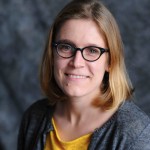Our Award-Winning Scientists
Lamont-Doherty researchers, both senior and early career, as well as our graduate students and postdoctoral researchers, continue to be recognized for their outstanding contributions to Earth science. A number of awards were bestowed on our scientists in 2013 and we are especially pleased to share the following.
- Mark Cane
- Terry Plank
- Arnold Gordon
- Tiffany Shaw
Mark Cane, an expert on the El Niño climate pattern, and Terry Plank, an authority on explosive volcanoes, were elected to the National Academy of Sciences. Election to the National Academy, in recognition of excellence in original scientific work, is one of the highest honors awarded to scientists in the United States. Of the 84 scientists elected in 2013, just five were Earth scientists, and we are thrilled that two of those scientists are from Lamont.
Cane was also the recipient of the American Geophysical Union’s 2013 Maurice Ewing Medal. Named for Lamont’s founding director, the Ewing Medal is awarded for “significant original contributions to the scientific understanding of the processes in the ocean; for the advancement of oceanographic engineering, technology and instrumentation; and for outstanding service to the marine sciences.”
Oceanographer Arnold Gordon is the winner of the 2013 Prince Albert I Medal for his outstanding contributions to oceanography. The medal is given by the International Association for the Physical Sciences of the Ocean (IAPSO). Only the seventh recipient of this medal, Gordon was cited for his “outstanding contribution to our knowledge of the general circulation of the ocean and especially for his studies of the Southern Ocean and inter-ocean exchange.”
Atmospheric scientist Tiffany Shaw was one of 16 researchers awarded a prestigious Packard Fellowship in Science and Engineering in 2013. This award is given to young investigators to further their work in science and engineering. Shaw studies the fluid dynamics of Earth’s weather and climate, using a combination of theory, observations and numerical models. Her research focuses on understanding how moisture is transported and how it interacts with large-scale flow patterns, such as the summer monsoon, as well as the impact of climate change. Shaw also received a Faculty Early Career Development (CAREER) award from the National Science Foundation in recognition of her research and educational activities.



